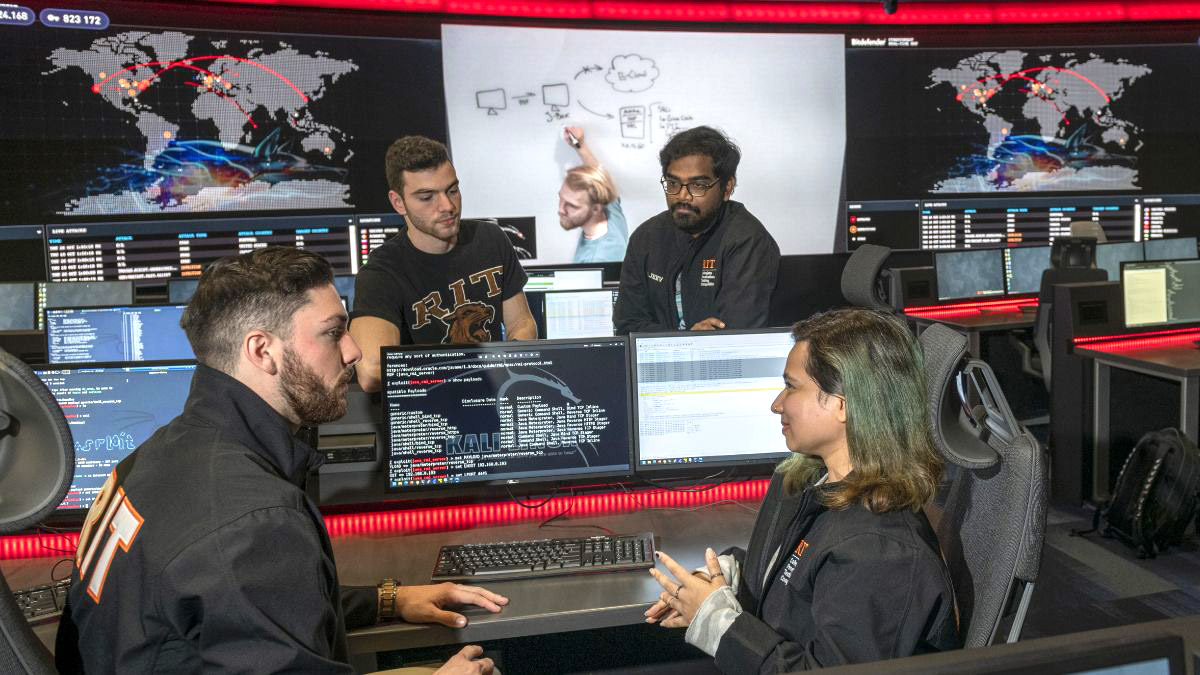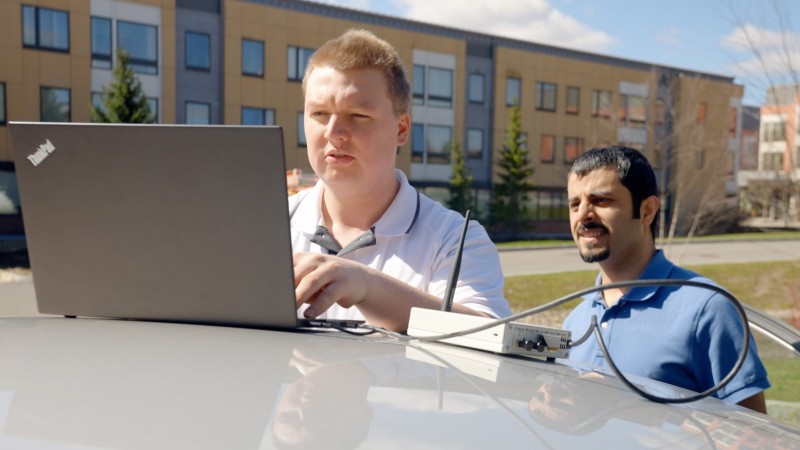Cybersecurity Master of Science Degree

Cybersecurity
Master of Science Degree
- RIT /
- Rochester Institute of Technology /
- Academics /
- Cybersecurity MS
Overview for Cybersecurity MS
STEM-OPT Visa Eligible: The STEM Optional Practical Training (OPT) program allows full-time, on-campus international students on an F-1 student visa to stay and work in the U.S. for up to three years after graduation.
RIT is designated as a National Center of Academic Excellence in Cybersecurity Research and Education by the National Security Agency.
Study at RIT’s new ESL Global Cybersecurity Institute, a state-of-the-art, 52,000-square-foot facility designed for advanced cybersecurity education, training, and research.
There is critical importance to building security and survivability into the hardware and software of computing systems as they are designed and developed, rather than trying to add it on once these systems have been designed, developed, and installed. Our master's in cybersecurity gives you an understanding of the technological and ethical roles of computing security in today's society and its importance across the breadth of computing disciplines.
RIT’s Cybersecurity Master’s Degree
RIT’s master’s in cybersecurity enables you to develop a strong theoretical and practical foundation in security computing, preparing you for leadership positions in the cybersecurity industry, academia, or research careers, or to pursue a more advanced degree in cybersecurity or another computing discipline.
The cybersecurity master’s degree is designed for students who have an undergraduate computing degree in an area such as computing security, computer science, information technology, networking, or software engineering, as well as those who have a strong background in a field in which computers are applied, such as computer or electrical engineering.
Cybersecurity MS Courses
The cybersecurity master’s degree consists of core courses, technical electives, and a thesis, project, or capstone experience.
You can develop a specialization in one of several cybersecurity-related areas by selecting technical electives under the guidance of a faculty advisor.
ESL Global Cybersecurity Institute: Advancing Cybersecurity Education
The ESL Global Cybersecurity Institute is a state-of-the-art, 52,000-square-foot facility designed for advanced cybersecurity education, training, and research. You will learn from experts who have developed a world-class curriculum that covers cybersecurity to managing information systems as you build secure systems and new technologies. You'll also have access to the Cyber Range, which generates the real world feel of responding to a cybersecurity crisis for governments and industries to test their security and identify innovative/effective solutions.

-
Affordable Now. Valuable for Life.
Earn your master’s degree without the full price tag. With Master Up you can receive a 30% tuition scholarship for an RIT master’s degree.
-
Join us for Fall 2026
Many programs accept applications on a rolling, space-available basis.
Careers and Cooperative Education
Typical Job Titles
| Associate Detection and Response Engineer | Backend Developer | Cyber Defense Solutions Engineer |
| Cyber Security Analyst | Cyber Security Consultant | GRC Consultant |
| Incident Response Analyst | Information Technology Analyst | Security Engineer |
| Systems Engineer |
Cooperative Education
What makes an RIT education exceptional? It’s the ability to complete relevant, hands-on career experience. At the graduate level, and paired with an advanced degree, cooperative education and internships give you the unparalleled credentials that truly set you apart. Learn more about graduate co-op and how it provides you with the career experience employers look for in their next top hires.
Cooperative education is optional but strongly encouraged for graduate students in the computing security MS degree.
Featured Work and Profiles
-
Video: RIT Computing Graduate Students Thrive in Academia and Industry
Learn more about our leading research opportunities and state-of-the-art facilities in this new video.
Read More about Video: RIT Computing Graduate Students Thrive in Academia and Industry -
RIT's AI Tools Help Journalists Identify Deepfakes
RIT experts are helping journalists and intelligence analysts detect digital deception
Read More about RIT's AI Tools Help Journalists Identify Deepfakes -
Making Self-Driving Vehicles Safer From Hacking
RIT cybersecurity researchers are preparing connected vehicle networks for the next stage of cybersecurity—the post-quantum era.
Read More about Making Self-Driving Vehicles Safer From Hacking -
Amazon Exec Empowers Next-Gen Cybersecurity Talent
Amazon executive and RIT alum Arthur Deane ’08 (electrical engineering) is helping cybersecurity students unlock opportunities in the rapidly growing tech sector.
Read More about Amazon Exec Empowers Next-Gen Cybersecurity Talent -
Meet Nishi Prasad
Last summer, Nishi Prasad completed a co-op with RIT and Eaton Corporation, testing embedded devices. The co-op opened doors for her at RIT as a student leader and connected her to the university and...
Read More about Meet Nishi Prasad
Curriculum for 2025-2026 for Cybersecurity MS
Current Students: See Curriculum Requirements
Admissions and Financial Aid
This program is available on-campus only.
| Offered | Admit Term(s) | Application Deadline | STEM Designated |
|---|---|---|---|
| Full‑time | Fall | Rolling | Yes |
| Part‑time | Fall | Rolling | No |
Full-time study is 9+ semester credit hours. Part-time study is 1‑8 semester credit hours. International students requiring a visa to study at the RIT Rochester campus must study full‑time.
Application Details
To be considered for admission to the Cybersecurity MS program, candidates must fulfill the following requirements:
- Complete an online graduate application.
- Submit copies of official transcript(s) (in English) of all previously completed undergraduate and graduate course work, including any transfer credit earned.
- Hold a baccalaureate degree (or US equivalent) from an accredited university or college in computing security, computer science, software engineering, information technology, networking, computer engineering, electrical engineering, applied mathematics, or computer engineering technology (exceptional students from other fields may be admitted on a contingent basis). A minimum cumulative GPA of 3.0 (or equivalent) is recommended.
- Satisfy prerequisite requirements and/or complete bridge courses prior to starting program coursework.
- Submit a current resume or curriculum vitae.
- Submit a personal statement of educational objectives.
- Submit one letter of recommendation.
- Entrance exam requirements: GRE optional for Fall 2026 applicants
- Submit English language test scores (TOEFL, IELTS, PTE Academic, etc.), if required. Details are below.
English Language Test Scores
International applicants whose native language is not English must submit one of the following official English language test scores. Some international applicants may be considered for an English test requirement waiver.
Duolingo (DET): 130
IELTS: 6.5
LanguageCert Academic: 74
PTE Academic: 60
TOEFL: 88/4.5
International students below the minimum requirement may be considered for conditional admission. Deaf and hard-of-hearing test takers with significant hearing loss do not need to take the listening and speaking sections for the TOEFL and IELTS. Each program requires balanced sub-scores when determining an applicant’s need for additional English language courses.
How to Apply Start or Manage Your Application
Cost and Financial Aid
An RIT graduate degree is an investment with lifelong returns. Graduate tuition varies by degree, the number of credits taken per semester, and delivery method. View the general cost of attendance or estimate the cost of your graduate degree.
A combination of sources can help fund your graduate degree. Learn how to fund your degree
Additional Information
Prerequisites
Applicants must satisfy prerequisite requirements in discrete mathematics, statistics, and computing (programming including Python, computer networking theory and practice, and systems administration theory and practice).
Bridge Courses
Students whose undergraduate preparation or employment experience does not satisfy the prerequisites required for the program may make up for deficiencies through additional study. Bridge course work, designed to close gaps in a student's preparation, can be completed either before or after enrolling in the program as advised by the graduate program director. Generally, formal acceptance into the program is deferred until the applicant has made significant progress through this additional preparation.
If completed through academic study, bridge courses must be completed with a grade of B (3.0) or better. Courses with lower grades must be repeated. Bridge courses are not counted toward the 30 credit hours required for the master's degree. However, grades earned from bridge courses taken at RIT are included in a student's graduate grade point average.
A bridge program can be designed in different ways. Courses may be substituted based on availability, and courses at other colleges may be applied. All bridge course work must be approved in advance by the graduate program director. For more information on the bridge program, please consult the Computing Security MS Student Handbook.
Accreditation
FAQs
Yes, the cybersecurity MS is a STEM Optional Practical Training (OPT) program which allows full-time, on-campus international students on an F-1 student visa to stay and work in the U.S. for up to three years after graduation.
Applicants must have college-level credit in discrete mathematics, statistics, and computing (including Python programming, networking theory, and systems administration). Bridge courses are available if you are missing specific prerequisites.
Yes, co-op is optional but strongly encouraged for cybersecurity MS students. It provides the opportunity to complete relevant, paid career experience with industry partners prior to graduation.
Yes, the cybersecurity MS offers both a thesis option (for students interested in research) and a capstone project option (for students focused on professional application).
Research
Cybersecurity faculty are actively engaged in consulting and research in various areas of secure computing and information assurance, such as cryptography, databases, networking, secure software development, and critical infrastructure security. There are opportunities for students to participate in research activities towards capstone completion or as independent study work.
In addition, the Golisano College of Computing and Information Sciences is home to some of the world’s leading researchers in cybersecurity. Researchers explore attacking and defending, and developing next generation solutions for industry and individuals. Learn more about ongoing research at the college’s Global Cybersecurity Institute.
Related News
-
February 23, 2026

Algorithms that customize marketing to your phone could also influence your views on warfare
Justin Pelletier, a Professor of Practice and director of the GCI Cyber Range and Training Center, discussed how AI systems are becoming tools for strategic influence in an article for The Conversation.
-
January 13, 2026

Top cybersecurity students across the globe face-off at RIT’s pentesting competition
The best cybersecurity students in the world came to RIT to battle in the Collegiate Penetration Testing Competition global finals, wrapping up the largest offense-based cybersecurity competition for college students.
-
December 12, 2025

Digital Twins Are Changing University Campus Operations
Government Technology speaks to David Schwartz, director of the School of Interactive Games and Media, about digital twins—virtual versions of real-world spaces.
Contact
- G Jackson Gagnier
- Assistant Director, Graduate Admissions
- Graduate Admissions
- Enrollment Management
- 585‑475‑6768
- gjgges@rit.edu
- Sumita Mishra
- Professor, Cybersecurity
- Department of Cybersecurity
- Golisano College of Computing and Information Sciences
- 585‑475‑4475
- sumita.mishra@rit.edu
Department of Cybersecurity






















